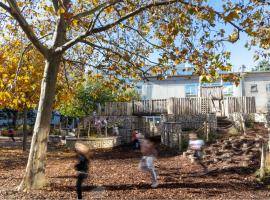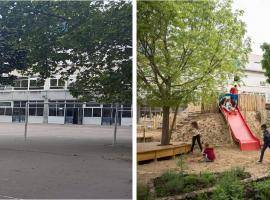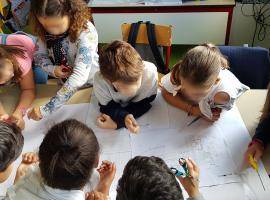Training sessions and study tours: a good compelling start for OASIS

Training sessions
On May 16th, 20th and 21st, about 50 participants from the educational an technical departments followed an initial training to improve their knowledge regarding the stakes of the project and to build skills to ensure the design, the implementation and exploitation of these new spaces. In addition to the various interventions (on climate change, biodiversity, water management, or sharing space), visits were organized to allow greater understanding of concrete development opportunities. On September 16th and October 10th, adults from the ten pilot schools (school directors, teachers, animators,…) benefited from training sessions as well. Partners to the project have thus proposed to these educational communities training sessions in order to inform them about the main issues of the Oasis Project (concerning climate change such as children specific needs in terms of space, games or interactions with Nature). Please find videos of this training (in French) here. This training was also the occasion to present an educational toolkit, which is designed to help the adults of the schools organise activities with students.
Study tours in Belgium and in Barcelona
On October 2nd, 3rd, 4th, more than 50 stakeholders of the project (national education staff, technical and educational agents from the city of Paris, partners of the project) went to Belgium (Brussels and Antwerp). This trip helped to bring together the project's stakeholders, to spark the debate and to share common interrogations.
In addition to this first study trip, 4 members of the consortium went to Barcelona from October 24th to 26th, to observe newly renovated and open schoolyards. The city of Barcelona was also selected as part of the "Innovative Actions" program concerning its "Escoles Refugis Climatics" project, which aims at transforming ten schools by adapting them to climate change. For several years, the city of Barcelona has been developing a program of open schoolyards "Patis Oberts" during the weekends.
The main lessons learnt from those trips are the necessity:
- to refocus the renovation of schoolyards on the well-being of children, especially through nature;
- to design more natural spaces at lower costs, and use the existing materials (reuse of pavements, concrete removed as backfill, ...).
- to diversify the “spaces” in the schoolyards and their renaturation allow to regulate the conflicts, to observe more “gender-mixed” activities, to develop the games of cooperation and the imagination of children
- to share the idea that risk is crucial for education, and that more "adventurous" areas allow children to strengthen their motor skills and develop their resilience abilities. The idea is to think schoolyards not "as safe as possible" but "as safe as necessary"
-to reinforce the participative dimension (parents, children, teachers) for building schoolyards and for maintaining them - especially in the context of openings outside of educational times
-to open schools in order to offer new spaces for playing for families in a very dense city, to allow the development of improved connections with schools’ parents as well as to reinforce the social bonds within neighborhoods.
The study tour to Barcelona was also an occasion for both "Escoles Refugis Climatics" and Oasis UIA projects to share experience and knowledge collected during this first year of implementation.
Find more about the study tours and watch this reporting video below


















